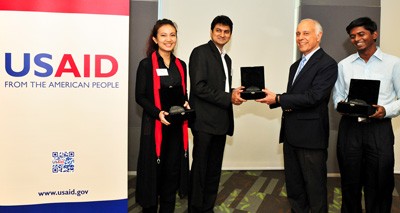
For Immediate Release
BANGKOK, January 21, 2015 – An innovative mobile healthcare application that connects rural patients to doctors has won this year’s U.S. Agency for International Development/Regional Development Mission for Asia’s (USAID RDMA) Mobiles for Development (M4D) Award. The contest, now in its second year, recognizes mobile services in Southeast Asia that have the potential to improve development outcomes in climate change, food security, health, governance, biodiversity or fisheries.
The winner, mPower Social Enterprise from Bangladesh, plans to expand its Amader Daktar (or “Doctor in a Tab,” referring to remote medical consultations provided over a tablet device) service into Myanmar in partnership with mobile network operator, Telenor, in order to reach rural populations with basic medical care. The service currently has 200 locations in Bangladesh and has served over 1,200 clients to date.
“mPower and the other finalists are successfully using mobile technology to address pressing development issues in Asia,” said USAID RDMA Director Michael Yates. “These innovative apps are powerful tools that accelerate delivery of essential services to underserved communities.”
Judges picked mPower for its user-friendliness and functionality, coupled with its strong business model which strengthens viability and sustainability. The service includes a tablet application that allows rural health intermediaries to collect basic health details about patients and connects them via video conference with doctors in urban areas who can diagnose illness and prescribe treatment. Amader Daktar aims to improve rural health care and reduce the number of people whose illnesses are aggravated by a lack of, or delay in, proper diagnosis and treatment. mPower will use the $10,000 in M4D award funds to prototype its service in Myanmar, where health care services, particularly in rural areas, are difficult to access.
The other top finalists out of the pool of 15 applicants were Awaaz De’s Farmers’ Friend and Ooredoo’s MayMay. Farmers’ Friend provides farmers in India with customized voice messages created by qualified agronomists on crop production, horticulture, livestock and plant protection up to three times a week. Through the app, farmers can share the information and respond with questions or feedback, contributing to a hub of helpful information. The service currently has over 17,000 subscribers in India and will be available in two languages in Southeast Asia later this year.
MayMay targets women in Myanmar , with a particular focus on pregnant women and their partners, families and communities. The app provides a wealth of maternal, child health and wellness information for both during and after pregnancy, sends tailored maternal advice alerts and connects women with health care providers in the area. Although still in beta form, the app has already been downloaded more than 6,000 times and is projected to reach up to 700,000 users in Myanmar within the next five years. Ooredoo also plans to launch the service in Indonesia this year.
USAID’s Mobiles for Development in Asia Award winner and finalists were announced at the second annual Mobiles for Development Forum on January 20 in Bangkok. Co-organized by USAID’s Regional Development Mission for Asia and FHI 360, the two-day event featured discussion on how to develop a more inclusive approach to M4D, resulting in lasting and impactful interventions. Local technology firms, USAID and its implementing partners, other donors, mobile network operators and academics participated.
“Since last year’s first Mobile Solutions for Development in Asia forum, we’ve continued to increase integration of science and technology into USAID’s regional portfolio, including by using mobile and other technologies to accelerate development progress; supporting research to fill knowledge gaps; and strengthening capacities for evidence-based decision-making,” said USAID Director Yates.
See more photos and videos here.







Comment
Make a general inquiry or suggest an improvement.